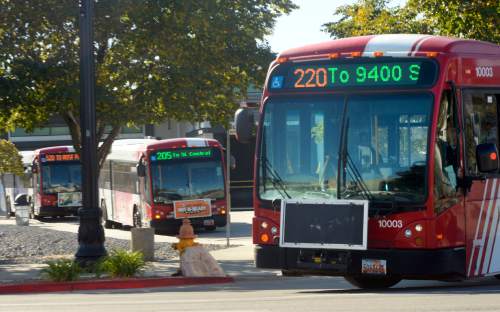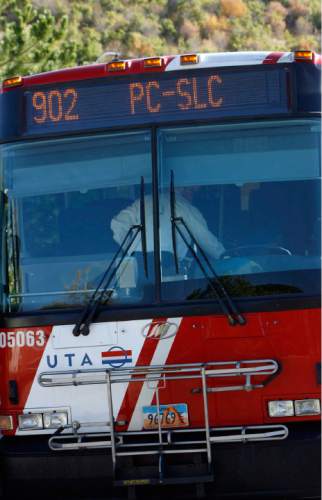This is an archived article that was published on sltrib.com in 2016, and information in the article may be outdated. It is provided only for personal research purposes and may not be reprinted.
The Utah Transit Authority Board on Friday approved launching a controversial transit project by gambling up to $23.8 million in advance funding that it says federal and county government will almost surely reimburse later.
That upset groups trying to use a voter referendum to thwart the $150 million bus rapid transit line in Provo and Orem.
They say UTA is speeding up work so that voters would be less willing to stop it after big sums already have been spent. The agency counters that starting now will avoid delays and save $3 million to $5 million in construction costs.
"UTA is hoping to begin construction and have the project well underway before the referendum can even get to court" in expected legal battles, said Frank Anderson, spokesman for the referendum effort.
"Provo and Orem residents are thrifty people who are not going to like the thought of spending $16 million [or more] on preliminary BRT construction only to see it wasted," he said. "The referendum group would be blamed for the waste of money — unfairly."
In a special meeting Friday, the UTA Board voted 10-2 to advance money that it hopes will be reimbursed to start the project now.
The agency expects federal grants of $75 million to pay half the transit portion of the project (but not any of an additional $40 million worth of related road-improvement work). That grant has not been awarded yet.
Acting UTA President and CEO Jerry Benson wrote a memo to the board that the Federal Transit Administration gave the agency "no prejudice authority" to "begin work with the understanding that the expenditures are eligible to be charged against the grant once it has been received." He said doing exactly that is common nationally.
"There is some risk," Benson conceded, "but we are not aware of a project that [has] not received a grant once it has been given this no prejudice authority."
Meanwhile, Utah County has agreed to issue bonds to help finance such costs once the federal grants are approved. UTA has asked the county instead to issue them as soon as possible, which is under review by the county attorney.
Benson told the board that if it chose not advance the money, that surely "would delay and increase the cost of the project" by $3 million to $5 million.
Benson said UTA has negotiated for utility work to begin the project and is about to enter a contract to order special, extra-long buses that will be needed. He said proceeding with such contracts requires advancing up to $23.8 million this year.
Even if federal grants never came and the project fell apart, Benson said about 80 percent of the spending would still be useful to UTA and residents.
The agency has long said that it would like the BRT buses to begin operating in spring 2018. They would connect FrontRunner stations in Provo and Orem via Utah Valley University, University Mall, Brigham Young University, downtown Provo and the Provo Towne Centre mall.
On Friday, Orem, Provo, the Utah Department of Transportation and the Mountainland Association of Governments sent a letter supporting the advance funding to begin the project now.
Opposing it were grass-roots groups in Provo and Orem. They have submitted petitions seeking to undo no-cost leases approved by both city councils to allow UTA to use city streets for the project. They say that could thwart federal-local cost share agreements, stop federal funding, and kill the project.
Benson, however, said it would not kill the project, but only alter small portions where Orem and Provo streets are used — and it could foil enhancements the cities sought.
State law allows residents to challenge new laws passed by city councils if they obtain enough signatures within 45 days of passage to put the issue on the ballot. The Utah County
Clerk's Office verified this week that the groups collected enough.
Provo and Orem officials are using an allowed 15-day period to review petitions before they are expected to reject them.
"Provo and Orem are dragging their feet," Anderson said, "in order to give UTA time to start building BRT even though the federal funds aren't there yet."
Provo Mayor John Curtis disagreed. "It took the county weeks and weeks and weeks" to verify signatures, "and now we've had them since Monday," he said. "It serves no purpose for the city to drag it on. We're as anxious to have it resolved as they are," but added the cities intend to reject the petitions.
Provo and Orem officials have said they believe the referendums are illegal, contending that the leases they seek to overturn are administrative actions and not the type of new ordinances that state law allows to be challenged.
Petitioners say they intend to seek an expedited review by the Utah Supreme Court.
Several people asked the UTA Board on Friday to wait for resolution of the referendum fight before proceeding with the project.
George Stewart, a current Provo City Council member and former mayor, said public trust of UTA is low and "it will be lessened if we make an end run around the referendum process before the Supreme Court decides."
George Chapman, board member of the watchdog Utah Transit Riders Union, said, "Federal funding is not a sure thing, especially when anybody protests an application." He added, "I'm asking you not to do it, not to go out on a limb. You're going to regret it."





